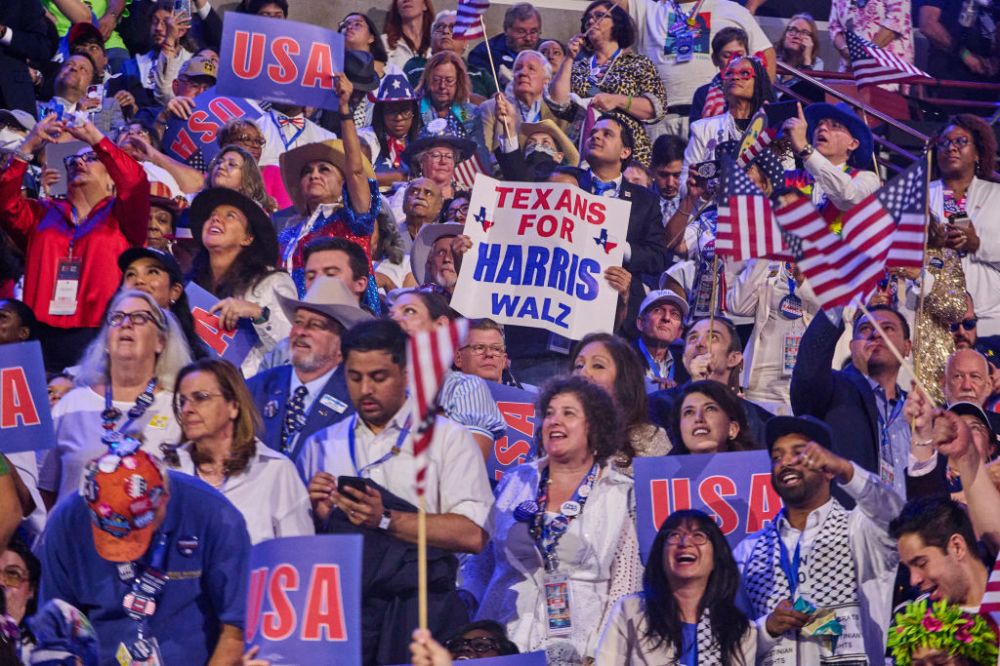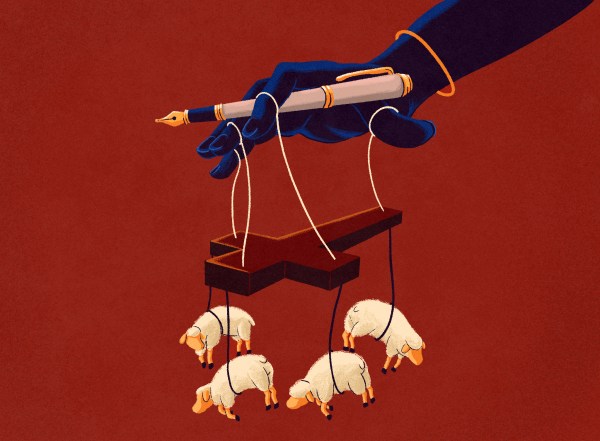Hello and happy Saturday. Were you waiting for the “surprise guest” who never showed Thursday night at the Democratic National Convention? I know the scuttlebutt centered around Taylor Swift and Beyoncé, but I can’t be the only one who wondered if it might actually be Lee Greenwood belting out “God Bless the U.S.A.”
Kidding! I’m kidding! And I apologize for conjuring the ear worm. But the party that the Democrats threw in Chicago this past week looked vastly different from what anyone could have predicted five weeks ago. With the Republicans coming out of their own convention on a kind of adrenaline high that kicked in when Donald Trump survived an assassination attempt, and with Democrats seemingly mired in the quicksand that was the Biden campaign, it seemed like the DNC would resemble a wake more than a rally.
We all know what happened next. (Just for kicks, imagine it set to “Yakety Sax.”) Biden stepped aside and the party rallied around Vice President Kamala Harris, who then did a bunch of Zoom calls and raised a pile of money, picked Tim Walz as running mate, and went out on tour.
But the convention would be a test for the vice president: She had not revealed much in the way of policy, she faced criticism for not addressing the media, and everyone wondered how she would handle the party’s divide over the war in Gaza. It would also be a test for the party: Was there depth to the early broad support that Harris had enjoyed? Could Democrats keep the momentum going? Would they offer any gestures to voters in the center?
The answer to all of those questions was yes. The Clintons and the Obamas and Oprah Winfrey were on hand at the packed United Center, the expected protests from pro-Palestinian activists mostly fizzled, and the vibe (sorry, but this is a “vibes” election, after all) was downright patriotic. Attendees waved flags and shouted “U-S-A!” at various points, players from Walz’s high school football team joined him onstage, and Harris’ speech leaned into her child-of-immigrants, only-in-America success story.
On Monday night, Democrats celebrated President Biden, and he gave the keynote address. As the Dispatch Politics team noticed, it didn’t sound like it went through much of a rewrite after he ended his own campaign: “He was angry and defiant, presenting a self-congratulatory laundry list of his record—at home and abroad—while above all warning voters of the dangers of a potential second term for Republican nominee and former President Donald Trump.”
Perhaps it was fitting for the Democrats, then, that former President Barack Obama headlined the second night. His speech highlighted the fact that, to go forward, the party needed to go back a bit. To 2008 and “hope and change,” to be precise. The gang in Chicago noted this was (to borrow another term from that era), audacious.
Harris is, after all, the incumbent vice president. If she prevails, Barack Obama, his vice president, and his vice president’s vice president will have won four of the last five presidential elections. And she’s supposed to be the agent of change?
The message might seem absurd in 2024—if Republicans had nominated anyone other than the previous Republican president. But it just might work when deployed against Trump.
There were two days between Obama’s speech and Harris accepting the nomination (you can read about Walz’s speech Wednesday night here), but the transition was fairly seamless. She started off talking about her childhood in the San Francisco Bay area and she avoided crude jokes or bombastic rhetoric about her opponent. There were a few things in the middle of the speech that likely prompted eye-rolls from conservatives, particularly on abortion, and she tried to tie Trump to the controversial Project 2025 agenda that he has disavowed.
But Harris, who has faced scrutiny over her handling (or lack thereof) of the border crisis, deftly turned the tables on Trump when discussing immigration. She reminded the crowd that he had effectively doomed a bipartisan immigration deal from afar by calling on GOP senators to oppose it, and she vowed to sign it as president. She also spoke forcefully (though not too too specifically) on the two big foreign-policy issues she’d be dealing with: the wars in Gaza and Ukraine.
Given all that, Nick in Boiling Frogs (🔒) argued that, while Beyoncé never showed, the real “surprise guest” was Harris herself.
The biggest surprise from the surprise guest this week, though, was the strategic shrewdness she displayed in making her convention sound and sometimes even look … Republican. Harris seems to understand that there are many millions of Americans who’d prefer a more culturally conservative politics yet are hesitant to hand the government over (again) to a boorish lunatic obsessed with “retribution.” They don’t like Donald Trump, but they don’t like “wokeness” either.
Neither do I, Harris seemed to be signaling with her convention program, sincerely or not.
In his newsletter today (🔒), Chris Stirewalt looks back to the 1968 Democratic National Convention that also took place in Chicago to make an interesting historical analogy. The presidential primary system that we use to select nominees grew out of that convention—anti-war activists were unhappy that party leaders pushed VP Hubert Humphrey through—but perhaps this convention showed that we don’t need those primaries.
The enthusiastically patriotic, moderate-sounding, pro-Israel, proud former prosecutor we heard this week in Chicago is exactly the kind of candidate who could give the Republicans a terrible beating in November. She’s also the kind of candidate who could have never, ever emerged from a competitive Democratic primary process.
Well, that’s a wrap on the pomp and circumstance of the campaign season. From here on out, it’ll be all about rallies, the horse race, and debates. The Dispatch Politics reporters (once they’ve all recovered from their food comas) will be on the case, as will our newsletter writers and The Morning Dispatch team. As for me, I’m going to take next weekend off but I will see you in September. Thanks for reading.
Say you’re a conservative who dislikes Donald Trump and are genuinely curious about what kind of policies Kamala Harris might offer up. You probably didn’t go into the convention feeling very optimistic given that the Friday before, she vowed to ban “price gouging” on groceries. Kevin has some thoughts (as you might have guessed from the headline above). He reminds readers that labor is the biggest cost that influences our overall food expenditures, that wages went up during the pandemic, and that the extra money injected into the economy by both Trump and Biden meant that our dollars are worth less. “If you think, as Kamala Harris thinks, or says she thinks—(“thinks”)—that inflation in grocery prices is the result of ‘price gouging,’ then I don’t want to hear you ever complaining about conspiracy theories. Because that is a big, dumb conspiracy theory, the sort of thing that can be taken seriously only by asses of exceptional asininity.” He’s not the only one upset by the proposal: In Capitolism (🔒), Scott worries that the policies espoused not only by Harris but by Trump are threats to the well-being of serious economists.
The Democrats made a bit of a to-do about “reclaiming freedom” at the convention, and that got Jonah feeling a little philosophical in his Friday G-File. He starts with a rumination on whether cities are more free than small towns and rural areas, discusses the Founding Fathers and great thinkers who disdained urbanity and preferred nature, and notes that it’s a little weird that conservatives have come to scorn big cities, given that capitalism depends on them. On the other hand, progressivism is popular among big-city liberals and yet, Jonah writes, “The qualities of small-town life that cultural conservatives celebrate—with much good reason—are precisely the qualities that progressives want to impose from above on the nation as a whole. … The problem is that you cannot scale up small-town life. You cannot make a diverse, continental nation, a sprawling commercial republic of 331 million people operate like Mayberry.” It’s a very intellectual—and entertaining—wind-up to get to his real point: positive freedoms vs. negative freedoms. The Bill of Rights is an example of negative liberty: “Our rights are assumed to be prior to government, endowed by our creator. And, therefore, the state cannot deprive us of them.” What the Democrats mean when they talk about freedom is usually the other kind: “Economic freedom means freedom from want, freedom from need. Because ‘necessitous men are not free men,’ [Franklin D.] Roosevelt argued, everyone has a right to a good job, a decent home, health care, etc. To be clear, I want every American to have these things, but I do not believe they should—or even can—have these things as rights.”
And here’s the best of the rest:
- Patrick T. Brown reviews two books that dive into the aftermath of the Dobbs decision that overturned Roe v. Wade. He writes that, while The Fall of Roe: The Rise of a New America by New York Times reporters Elizabeth Dias and Lisa Lerer is an attempt to understand both sides of the abortion debate, Undue Burden: Life and Death Decisions in Post-Roe America by Shefali Luthra is a “work of advocacy” that “takes for granted progressive stances on the necessity and morality of legalized abortion.”
- Inflation is one variable that Kamala Harris and Democrats can’t really control. Economist John Gustavsson argues that maybe a little honesty a few years ago would have better set expectations about the pain we would experience, but he also thinks it’s not too late. What we need now, he says, is a Domino’s ad. No, really.
- How serious of a threat does Hezbollah present to Israel if wider war breaks out in the Middle East? Charlotte writes that “Hezbollah now possesses more than 10 times the number of rockets and missiles it did during the Second Lebanon War. But that figure doesn’t capture the new qualitative threat—many of the projectiles today are more precise, longer-range, and deadlier than their predecessors.”
- You may have noticed that Kevin has been unimpressed with Kamala Harris’ record and proposals. So when he suggests that her policy on the Federal Reserve is more conservative than Donald Trump’s proposal, well … that says something.
- The pods! David and Sarah start with a question on Advisory Opinions: “Would you like a musket to go with your latte?” Tune in to see just what they are talking about. Ukraine’s incursion into Russia heralds big changes in that conflict, and Jonah welcomes military analyst Fred Kagan onto The Remnant to sort it all out. And on The Dispatch Podcast, former South Carolina Rep. Bakari Sellers talks to Jamie about his friend Kamala Harris and her ideological “fluctuations.”







Please note that we at The Dispatch hold ourselves, our work, and our commenters to a higher standard than other places on the internet. We welcome comments that foster genuine debate or discussion—including comments critical of us or our work—but responses that include ad hominem attacks on fellow Dispatch members or are intended to stoke fear and anger may be moderated.
With your membership, you only have the ability to comment on The Morning Dispatch articles. Consider upgrading to join the conversation everywhere.